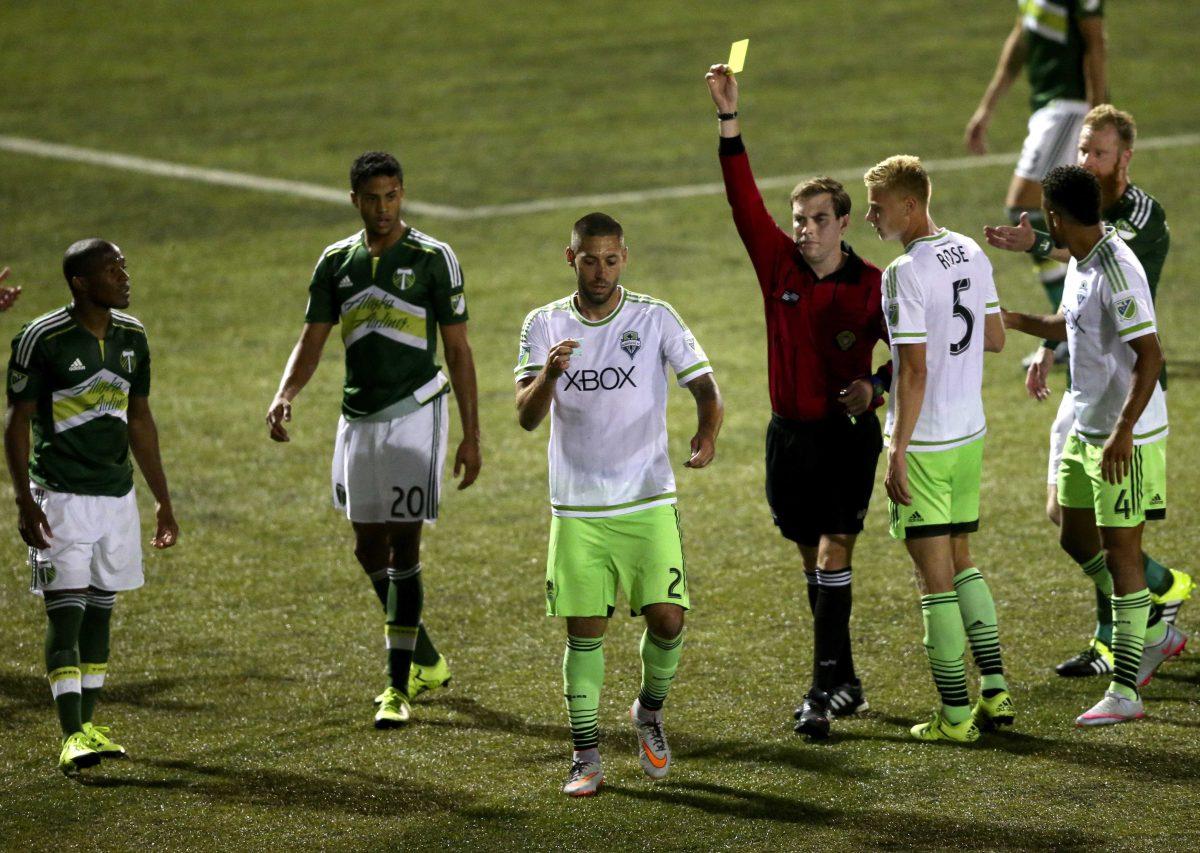Fall nights at the UREC’s soccer complex on River Road echo with the screams of college students abusing referees. I’ve played games on those fields where the referee left crying because the opposing team verbally attacked the female arbiter from the start of the opening whistle to the end of the match.
The mistreatment of referees in the United States stems from the sport’s highest league — the MLS.
F-bombs and other words you wouldn’t want your grandma to hear are both heard and seen on national TV. Players surround the referees, badgering and demeaning them. For a time, the MLS punished such actions with match bans and fines, but an all-time low in consistency arose last week when Clint Dempsey only received a three-match ban for slapping the referee’s notebook from his hands and then ripping it to shreds.
Dempsey’s continuous bad behavior reached its climax with what I consider referee assault. He gave the MLS disciplinary committee the perfect opportunity to make an example for the country’s youth of what unacceptable behavior is.
Unfortunately, the decision-making process never reached the committee. The required match ban for referee assault is six games, but Don Garber took it upon himself to classify Dempsey’s actions as “referee abuse,” not “referee assault.” Garber decided Dempsey’s fate based off commercial interests, rather than the protection of referees.
Here lies the problem with the MLS’ discipline policies. They’re vague, inconsistent and worst of all, commercially driven. If a lesser-known player had violently ripped a referee’s notebook apart and then had his teammates and opponents restrain him from returning to the referee, the player would have a minimum six-match ban and probably more.
Garber is not willing to protect referees, but local and state associations must pick up the slack, including LSU.
The UREC must consider the reasons for the constant abuse their referees receive. As a past player in the intramural leagues and a current United States Soccer Federation referee, my recommendation is proper training. While player behavior toward referees at the UREC is unacceptable, it mostly occurs because of the players’ fear for its safety and subsequent actions of taking player protection into their own hands.
After properly training its officials, the UREC should place employees at the fields as monitors with the power to record the names of players and teams who consistently abuse referees. The UREC must respond to referee abuse with game suspensions. If not, a progression of abuse will continue until a player assaults a referee and law enforcement steps in.
The failure to deal with referee abuse is detrimental to the game that so many LSU students love. Safety must be a priority for both the players and the referees, and without punishment for referee abuse, that safety is jeopardized.
In Michigan last year an angry player decided that punching the referee who gave him a red card was an appropriate action. That referee went into a coma and died days later.
Let’s not have a tragedy similar to Michigan’s. It’s time we begin protecting our referees and punishing players who abuse them.
Justin DiCharia is a 21-year-old mass communication senior from Slidell, Louisiana. You can reach him on Twitter @JDiCharia.
UREC must address referee abuse
June 22, 2015
In this photo taken Tuesday, June 16, 2015, Seattle Sounders FC’s forward Clint Dempsey (2) appears to rip up referee Daniel Radford’s notebook after Radford issued a red card to teammate Michael Ariza while playing the Portland Timbers in a U.S. Open Cup soccer match at Starfire Stadium in Tukwila, Wash. Dempsey was issued a red card his actions. (Erika Schultz/The Seattle Times via AP) SEATTLE OUT; USA TODAY OUT; MAGS OUT; TELEVISION OUT; NO SALES; MANDATORY CREDIT TO BOTH THE SEATTLE TIMES AND THE PHOTOGRAPHER





